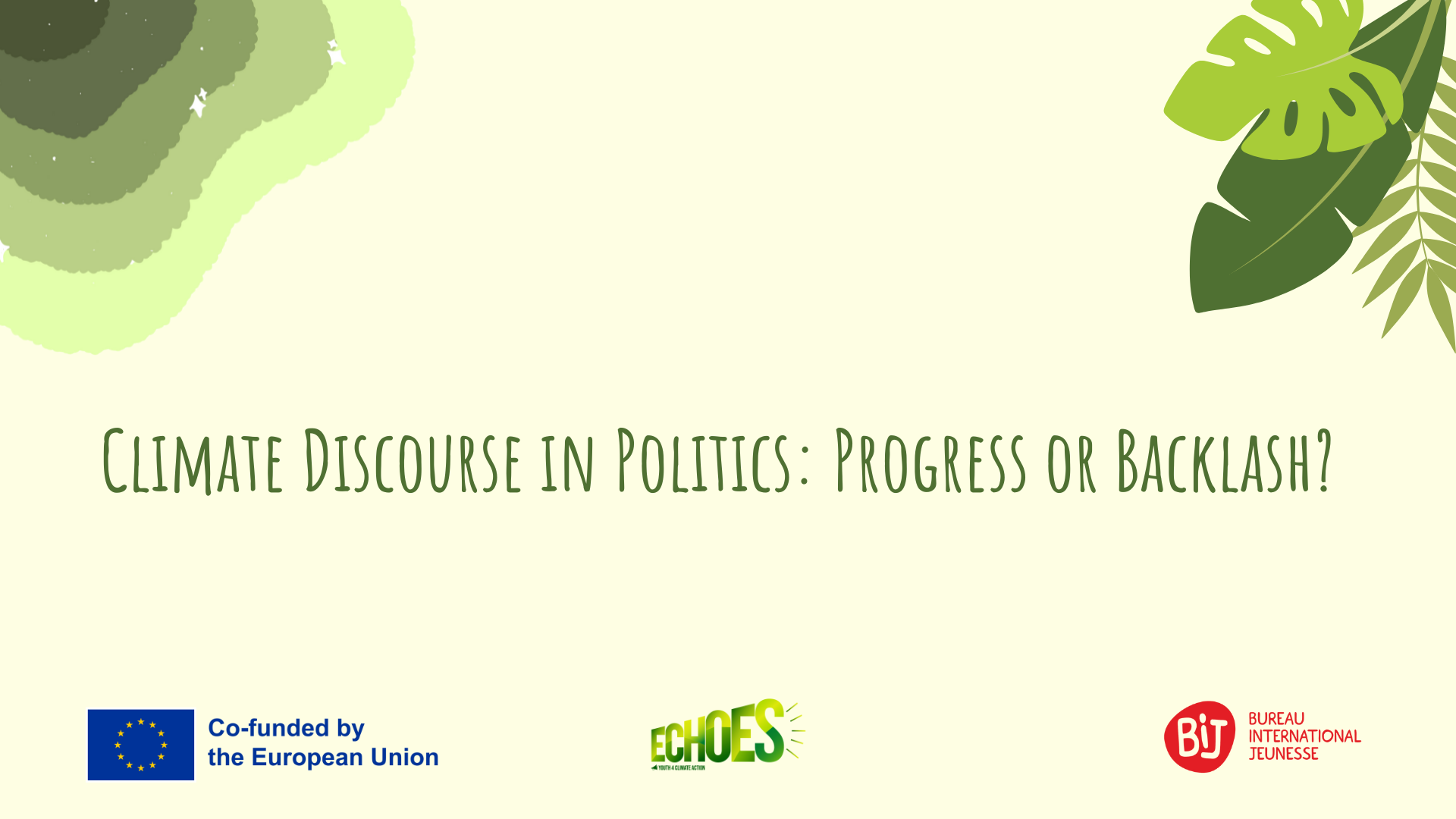
Climate Discourse in Politics: Progress or Backlash?
Have you ever noticed how many times climate is named in political talks and debates? And, have you ever wondered where green discussions are truly leading global political agendas?
Nowadays, thanks to the contribution of scientists and the continuous efforts to raise collective awareness, climate change is recognize as a definite phenomenon. However, even if we often hear about its causes and consequences, it seems that the implemented policies are not sufficient. Hence, the purpose of this short article is to evaluate the common tendencies in political discourses about sustainability and understand the direction they are taking.
Talking about climate is extremely useful for drawing people’s attention and raising awareness about the impacts of climate change. In this sense, political debates and discussions serve two relevant functions: they capture the citizen’s interests by addressing current issues and promoting political accountability; and they inform voters helping them making more informed decisions. Therefore, political talks are a powerful tool for spreading information about climate change and helping people building the necessary adaptability and resilience to the global warming.
Since the first World Conference on Climate Change back in 1979, environment and climate have been in the core of political agendas all around world and the media attention was completely focused on the subject. The rhetoric of going green to ensure a valuable future for the next generations has been one a key component of numerous political debates and international forums. Over the past few decades, the commitment of the majority of countries to the common goal of reducing gas emissions and preventing climate change has been constant, but relatively effective. Indeed, the green rhetoric has often been used just as convenient tool for political purposes during electoral campaigns without the implementation of concrete actions after the elections.
Despite this, it’s important to highlight the effective improvements made at both global and local level: relevant investments have been made in the electric and wind energy; the Green Climate Fund (GCF) has mobilized over $10 billion to finance adaptation and mitigation projects in developing countries; as of 2020, 17% of the world’s terrestrial areas and 10% of marine areas are protected; In the EU, the recycling rate for municipal waste has increased from 35% in 2004 to 47% in 2019, improving the circular economy. These are just some of the positive and tangible policies that countries have been implemented. However, in recent times, particularly after 2024 – defined as “biggest election year in human history” by the UN – the climate change debate has gradually receded into the background in the current geopolitical context due to a global political turn to the right, the economic and social crises, and the perpetuating of the wars in Ukraine and Palestine. The US election campaign is just one example, but highly representative: the US president-elect calls the climate crisis “a big hoax” and he withdrawn USA from the Paris Agreement as one of his first actions.
Russia and China, two others major world powers, don’t show much interest in climate. Putin’s Russia has endured sanctions to maintain Russia’s robust oil and gas exports; while the Xi Jinping’s China is the first country in the world for CO2 emissions.
Even at the global level, the media attention was completely focused on the subject: the last COP29 on the climate change, held in Azerbaijan, was skipped by most world leaders.
As for Europe, in recent years, its politicians have been among the few to consistently prioritize climate change in their political campaigns and debates, even though with the last Parliamentary election tilting towards the right, there is a risk that the EU might move towards a position that is less inclined to support aggressive climate action.
These trends appear as a paradox: major climate events are happening more frequently everywhere, yet people are no longer willing to prioritize this. Nevertheless, climate change remain one of the core challenges of our generation that should be taken seriously regardless other political or economic issues and no matter the political colour.
Rising public awareness of climate change and other environmental issues has contributed to a general ‘greening’ of mainstream political discourse and clearly adherents of green or environmental politics have evolved from single-issue pressure groups into positions of substantial influence. Green political thinking, however, is far from homogenous and despite areas of consensus, competing perspectives over priorities and strategy mean there are many points of tension and disagreement. In this context, it’s important to keep the debate on climate opened at all level in order to prioritize the real necessities of our societies: a green, equal and sustainable development.
References
https://www.nature.com/collections/ccbbefcfgc
https://journals.sagepub.com/doi/10.1177/13540688231216282
European Parliament elections: climate policies will suffer | EnergyTransition.org
https://www.sciencedirect.com/science/article/pii/S2096232023000197